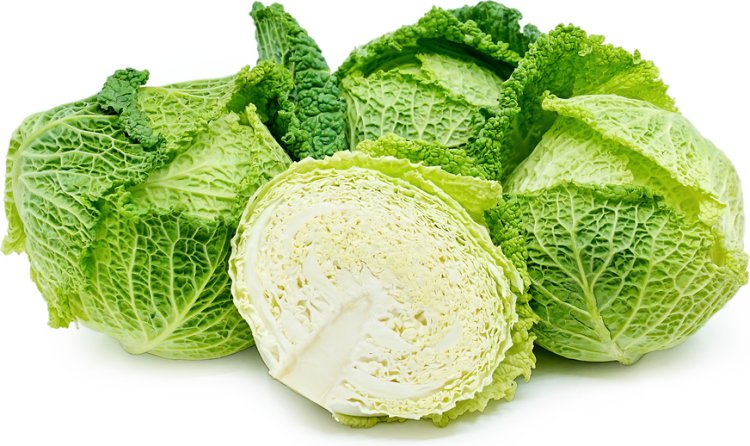7 Potential Health Benefits of Cabbage
Health Benefits of Cabbage: once you uncover its many health benefits, you may want to give cabbage pride of place on your plate.

Potential Health Benefits of Cabbage: Considering the nutritional value and antioxidant properties of cabbage, it is evident that this crisp and versatile cruciferous vegetable is underappreciated.
As a member of the Brassica genus of cruciferous vegetables, cabbage is related to cruciferous superfoods such as kale, broccoli, and Brussels sprouts. Similar to these verdant green relatives, cabbage contains high levels of antioxidants, which may account for its remarkable list of possible health benefits. In addition to being loaded with anti-inflammatory compounds, cabbage is rich in vitamins C and K, which provide their own health benefits.
Despite rumors that Prince Phillip used "cabbage" as a term of endearment for his wife, Queen Elizabeth II, and the fact that cabbage represents wealth and prosperity in Lunar New Year celebrations, cabbage does not have a particularly regal reputation. This rather unassuming crop of greens is rarely the focal point of a dish and is frequently employed more for its crisp texture than its flavor. However, once you uncover its many health benefits, you may want to give cabbage pride of place on your plate.
Here are seven Potential Health Benefits of Cabbage.
Seven Potential Health Benefits of Cabbage
1. Cabbage Helps Lower Inflammation
Underlying much of cabbage's health benefits is its anti-inflammatory properties. Each leaf is brimming with antioxidants, the consumable substances renowned for neutralizing harmful free radicals. According to research published in the International Journal of Food Sciences and Nutrition, kaempferol, quercetin, and apigenin are the most abundant antioxidants in green cabbage, whereas cyanidin is the most abundant antioxidant in red cabbage. These may have serious health consequences. According to research, cyanins have anti-diabetic, anti-cancer, and anti-obesity properties, while kaempferol has been linked to cancer prevention.
Glucosinolates are another beneficial component of cabbage. "When these compounds are consumed and absorbed into the tissues, they interact with signaling proteins in the cells to produce antioxidant and anti-inflammatory enzymes, proteins, and other protective molecules," explains Bryan Q. Le, PhD, a food scientist from Puyallup, Washington. "[This procedure] assists the body in eliminating highly reactive oxygen species and other noxious byproducts. This may provide some protection against cardiovascular diseases, carcinogens, and metabolic disorders like diabetes by reducing inflammation and oxidative stress.
2. Cabbage May Play a Role in Fighting Cancer
In recent years, there has been much discussion about the cancer-fighting potential of cruciferous vegetables. Cabbage is a member of the cruciferous family and contains a unique combination of cancer-fighting nutrients.
According to the United States Department of Agriculture (USDA), cabbage contains 25 milligrams of vitamin C per cup, which makes it an exceptional source. A diet rich in vitamin C may play a role in preventing lung, breast, and pancreatic malignancies, according to research.
Then there are again the beneficial glucosinolates. "After cutting, chewing, or digesting cabbage, glucosinolates break down into bioactive compounds with potential anti-inflammatory properties," says Cindy Chou, RDN, of The Sound of Cooking and Cancer Nutrition in a Bowl. Chou is an oncology dietitian and chef based in Santa Monica, California. The evidence supports this theory. "This may help with the detoxification of carcinogens," she adds. One example: According to a study of Chinese adults subjected to air pollution, those who consumed more glucosinolates had lower levels of toxic substances in their urine. In addition, a study published in April 2018 in The British Journal of Nutrition demonstrated that cruciferous vegetables, such as cabbage, are associated with a reduced risk of breast cancer. Other research published in Annals of Oncology connected cabbage to a decreased risk of colon cancer.
3. Cabbage Could Promote Recovery From COVID-19
If COVID-19 has rendered you incapacitated, consider cabbage soup as part of your recovery arsenal. According to a study published in the European Journal of Allergy and Clinical Immunology in August 2020, cabbage and fermented vegetables may mitigate the effects of severe COVID-19. The authors of the study hypothesized that antioxidant compounds in cabbage could reduce insulin resistance and injury to the lungs and blood vessels, two severe adverse effects of the virus.
Chou favors Napa cabbage and Taiwanese cabbage when preparing a soothing broth for the ill. "These two varieties work especially well in soups and stews when added during the last five minutes of cooking," she explains. Use kimchi as a side dish for noodles or eggs to obtain the antiviral benefits of cabbage and fermentation.
4. Cabbage Helps With Blood Clotting and Bone Health
Vitamin K may not be the most buzzworthy nutrient, but it’s not without its perks for health. As the National Institutes of Health notes, K is responsible for important functions like helping your blood clot properly and supporting healthy bones. Fortunately, cabbage is an excellent source, with 53 micrograms per cup, per the USDA.
One K caveat: This vitamin is fat-soluble, so when preparing cabbage, be sure to include a source of dietary fat to ensure absorption. According to farmer Amanda Terillo, RDN, who is based in Barboursville, Virginia, this shouldn’t be too difficult. “Many foods that you would cook with cabbage will naturally have fat, such as beef and fatty fish,” she says. “Other ways to include fats could be adding avocado to tacos with cabbage, using oil-based salad dressings in your cabbage salad, and using a good-quality mayonnaise to make coleslaw.”
5. Cabbage Is Good for Digestion
As an excellent source of fiber, cabbage may alleviate digestive issues such as diarrhea and constipation. According to the Mayo Clinic, the vegetable's insoluble fiber is a particular digestive aid savior because it adds heft to stool and promotes regular bowel movements. However, sulfuric compounds in cabbage may induce dyspepsia and bloating in some individuals. You may require experimentation to determine your tolerance level.
Consider adding fermented cabbage (also known as kimchi) to meals and nibbles for a double-whammy of digestive health benefits. "Lactobacillus bacteria are present in kimchi. "These lactic acid bacteria contain probiotics with health-promoting properties that can aid in digestion and support the gut microbiome by creating a diverse mix of healthy microbes in the intestines," explains Chou. A study published in Foods in November 2021 found that Lactobacillus-fermented foods could modulate the gut's response to stress. And according to a study published in The Journal of Nutrition in July 2020, fermented foods aid in overcoming gastrointestinal dysbiosis (the imbalance of gut microbes that can contribute to inflammation).
Also read: 8 Health Benefits of Cabbage
6. Cabbage Is High in Vitamin C
You may associate vitamin C with citrus fruits such as oranges and lemons, but cabbage is also a good source. In addition to its potential anticancer properties, cabbage's vitamin C provides numerous health benefits, beginning with improved epidermis health. According to research, since it stimulates collagen synthesis, it may contribute to a more youthful appearance. In addition, some studies have linked vitamin C with UV protection and a reduction in skin degeneration.
The benefits of C do not end there! "Vitamin C also aids in the healing of wounds, boosts the immune system, reduces the severity of certain periodontal diseases, and helps the body absorb iron, another essential mineral," explains Terillo. "Iron can be derived from either heme (animal) or nonheme (nonanimal) sources, but heme iron is better absorbed." To maximize the benefits of heme iron and vitamin C, Terillo suggests preparing cabbage as a side dish for lamb or another red meat roast, or as a topping for a sardine sandwich.
7. Cabbage Boosts Heart Health
Cardiovascular health and inflammation are inextricably intertwined, so it should come as no surprise that cabbage, which is high in antioxidants, is a heart-healthy food. The kaempferol and quercetin found in green cabbage, as well as the cyanins in red cabbage, have been shown in some studies to promote cardiac health. In the meantime, a British Journal of Nutrition study published in February 2021 found that older women who consumed more cruciferous vegetables had less abdominal aortic calcification, a risk factor for cardiovascular events. Grab a cabbage and chew it up to promote heart health and reap numerous other benefits.













